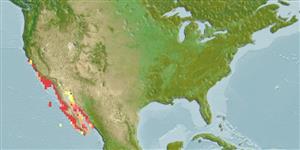Elasmobranchii (sharks and rays) >
Torpediniformes (Electric rays) >
Platyrhinidae (Fanrays)
Etymology: Platyrhinoidis: Greek, platys = flat + Greek, rhinos = nose + Greek, oides = similar to (Ref. 45335).
More on authors: Jordan & Gilbert.
Environment: milieu / climate zone / depth range / distribution range
Ecology
Marine; demersal; depth range 0 - 137 m (Ref. 96339). Subtropical; 38°N - 23°N, 124°W - 108°W (Ref. 114953)
Eastern Pacific: San Francisco, USA to Baja California, Mexico.
Length at first maturity / Size / Weight / Age
Maturity: Lm ?, range 48 - ? cm
Max length : 91.0 cm TL male/unsexed; (Ref. 2850)
Inhabits fine sand to mud bottom, often near kelp beds and sometimes abundant on mud flats of coastal bays. Often buries itself in bottom sediments. Ranges from the intertidal zone to 50 m depth (Ref. 12951). Solitary or in small groups, gathers in shallow bays, lagoons, and off beaches (Ref. 12951, Ref. 114953). Feeds on small sand-dwelling crustaceans, worms and mollusks. Ovoviviparous (Ref. 50449), with 1 to 15 pups in a litter (Ref. 48844), mainly in August (Ref. 114953). Possesses ampullary electroreceptors with a region of maximum sensitivity of 5-15 Hz (Ref. 10011).
Exhibit ovoviparity (aplacental viviparity), with embryos feeding initially on yolk, then receiving additional nourishment from the mother by indirect absorption of uterine fluid enriched with mucus, fat or protein through specialised structures (Ref. 50449).
Eschmeyer, W.N., E.S. Herald and H. Hammann, 1983. A field guide to Pacific coast fishes of North America. Boston (MA, USA): Houghton Mifflin Company. xii+336 p. (Ref. 2850)
IUCN Red List Status (Ref. 130435)
Human uses
More information
Age/SizeGrowthLength-weightLength-lengthLength-frequenciesMorphometricsMorphologyLarvaeLarval dynamicsRecruitmentAbundanceBRUVS
ReferencesAquacultureAquaculture profileStrainsGeneticsElectrophoresesHeritabilityDiseasesProcessingNutrientsMass conversion
Tools
Special reports
Download XML
Internet sources
Estimates based on models
Preferred temperature (Ref.
123201): 15.3 - 23.1, mean 20.6 °C (based on 38 cells).
Phylogenetic diversity index (Ref.
82804): PD
50 = 1.0000 [Uniqueness, from 0.5 = low to 2.0 = high].
Bayesian length-weight: a=0.01000 (0.00244 - 0.04107), b=3.04 (2.81 - 3.27), in cm total length, based on all LWR estimates for this body shape (Ref.
93245).
Trophic level (Ref.
69278): 3.4 ±0.42 se; based on food items.
Resilience (Ref.
120179): Very Low, minimum population doubling time more than 14 years (Fec = 1).
Fishing Vulnerability (Ref.
59153): High vulnerability (56 of 100).
